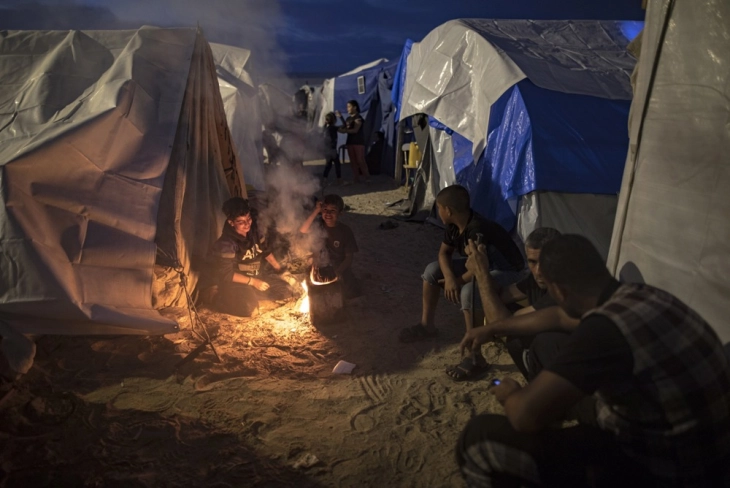UN says some 70% of Palestinians internally displaced by war in Gaza
- About 70% of the population, amounting to about 1.5 million people, has been displaced in the Gaza Strip since the beginning of the war with Israel, the UN Relief and Works Agency for Palestine Refugees in the Near East (UNRWA) said on Tuesday.

Tel Aviv/Gaza/Cairo, 7 Noveber 2023 (dpa/MIA) — About 70% of the population, amounting to about 1.5 million people, has been displaced in the Gaza Strip since the beginning of the war with Israel, the UN Relief and Works Agency for Palestine Refugees in the Near East (UNRWA) said on Tuesday.
Dozens of emergency shelters housing in total hundreds of thousands of people are sometimes overcrowded to four times their capacity, it said.
Conditions in some of the shelters are said to be deteriorating every day. In one shelter, there is less than 2 square metres available per person, UNRWA said.
At least 600 people have to share one toilet in one facility, and there have been thousands of cases of infectious diseases, diarrhoea and chickenpox.
According to Israeli reports, several Gaza Strip residents fled to the south of the coastal area on Tuesday with white flags in their hands.
Israel's Coordination of Government Activities in the Territories (COGAT) published a video showing thousands of Palestinians walking through the evacuation corridor.
Several people could be seen waving white flags. Others can be seen walking with their arms raised.
Earlier, Israel had given residents another four-hour time window to flee from the north to the south of the Gaza Strip.
On Tuesday, the Israeli army said it had clashed with Hamas fighters near a hospital in Gaza City.
The militant group had planned an attack on the Israeli armed forces from a building next to the hospital, the army said.
Israeli forces had taken control of a Hamas "military stronghold" in the northern Gaza Strip the previous day. Rockets and rocket launchers were found at the site, it said.
The army plans to increase the pressure on Gaza City, which is now completely surrounded by Israeli forces.
Israeli Prime Minister Benjamin Netanyahu ruled out a longer ceasefire in the Gaza Strip during an interview on US television on Monday.
Netanyahu also stated that Israel would take responsibility for security in the Palestinian territory for an "indefinite period."
On Israel's border with Lebanon, the Israeli army said it targeted and struck a suspected militant cell in Lebanon.
The military stated on Tuesday that a "terror cell" in the neighbouring country had attempted to fire anti-tank missiles towards Israel. An Israeli tank then returned fire.
It was initially unclear whether there were any casualties or injuries in the Israeli strike.
Israeli forces attacked a Hezbollah post earlier in the day to "counter a threat," but the specific nature of the threat was not disclosed by the army.
Loud explosions were heard across the area and sirens went off at a UN military base. UN sources told dpa that the peacekeepers were all in shelters.
A Lebanese security source said Israeli artillery hit areas near the village of Mais al-Jabal, setting several olive groves on fire.
Since the start of the Gaza war on October 7, there have been repeated cross-border clashes in the most serious escalation between both sides since the second Lebanon war in 2006.
There are daily confrontations between the Israeli army and the heavily armed pro-Iranian Hezbollah militants, who have links to Hamas. There have been casualties on both sides, including civilians and journalists.
Elsewhere, at a group of seven (G7) meeting in Japan, German Foreign Minister Annalena Baerbock urgently called for a humanitarian ceasefire in the Gaza war.
It was important to make it clear that "Israel is fighting Hamas, the terrorist organization, and not the innocent people in Palestine," Baerbock said.
The people need water, bread and, above all, medical care, she said.
According to the UN, 100 lorry loads of humanitarian aid are actually needed every day to supply the 2 million people in the Gaza Strip with the essentials.
An average of 33 trucks with relief supplies have arrived in the besieged Gaza Strip every day since the Rafah crossing was reopened, according to a Palestinian Red Crescent statement.
A total of 569 trucks of aid have crossed the border from Egypt since October 21, including 93 trucks on Monday evening.
On Tuesday, two more EU-funded flights with humanitarian aid goods, including medicines, refrigerators and containers left for Egypt, the European Commission said.
The UN High Commissioner for Human Rights Volker Türk is travelling to the Middle East for a round of diplomatic talks, his office said.
In the Gaza war, both the Islamist Hamas and Israel are accused of serious violations of human rights.
The Gaza Strip has been almost completely sealed off by Israel since fighters from the Islamist extremist movement Hamas launched an unprecedented assault on Israeli border communities on October 7, killing more than 1,400.
The number of Palestinians killed in Gaza since the start of the war on October 7 rose to 10,328, the Hamas-controlled Health Ministry said on Tuesday, saying that thousands of women and young people were among those who have died in Israel's retaliatory air and ground attacks.







